Hot Glass Bits 2001 Notes
(Hot Glass Bits #43)
Rev.
2008-11-27
Contact Mike Firth
Return to Sitemap
Unlike most previous issues of HGB, this one is in reverse
date order (for online reading of the newest stuff at the top.)
2001-12-25 E-mail message
Houston is starting……
CONTEMPORARY
STUDIO GLASS COLLECTORS GROUP
First Meeting:
Thursday, January 24, 2002 6:30 pm-8:30 pm
Houston Studio Glass
610 Jackson Hill
Houston, Texas
(713) 802-0500
www.houstonstudioglass.com
<http://www.houstonstudioglass.com>
Hosts: Richard Moiel and Kathy Poeppel
Meet with other artists and
collectors who are interested in sharing their interests in
contemporary studio glass.
Highlight of this meeting:
Video “Legacy of Glass”
For more information:
Contact Ardis Bartle at (281) 340-3600x222 or ardis@pgas.com
To All Art Lovers
interested in Collecting Contemporary Studio Glass Lover:
You are invited to our First
Meeting:
Thursday, January 24, 2002 6:30 pm-8:30 pm
Houston Studio Glass
610 Jackson Hill
Houston, Texas
(713) 802-0500
www.houstonstudioglass.com
<http://www.houstonstudioglass.com>
Hosts: Richard Moiel and Kathy Poeppel
Agenda:
Determine Name for the Association
Possible Names Include:
Houston Alliance for Contemporary Glass
Glass Alliance Houston (GAH)
Houston Contemporary Art Glass Group
Houston Contemporary Glass Alliance
Houston: Metropolitan Glass Group
Determine Purpose and Direction of
Group
- ·
Expand Awareness and
appreciation of contemporary studio glass
·
Promotion of Glass as
an art form
·
Trips and Tours of other
Collections
·
Visiting Studios and Artists
·
Information and Education
Determine function and structure
of Group
- ·
Board
·
Membership Dues
·
Relationship with Art
Alliance for Contemporary Glass
Discuss Upcoming Calendar for
Spring 2002
View Film on “Legacy of Glass”
Calendar of Upcoming Events in United
States for Glass
Collectors and Artists
RSVP, please: Ardis Bartle (281) 340-3600x222, (713) 927-3650 ardis@pgas.com
Ardis Bartle, Sales Representative,
PGAS Systems, (281) 340-3600 x222, Fax: 281 340 3609, ardis@pgas.com, www.pgas.com
2001-12-21 I haven't been keeping up
my notes here, but I have been working and noting elsewhere.
Finally got the glass sagged for the whirly
jig and installed it with silicone sealant for glue. Have
built and almost finished the glass garage
doing a test run tonight on the element after pinning it and
shorting the split bolts, so they are now insulated with sealant
and setting. Opened my tube of E-6000 and glued
up some window glass in a test piece. So stinky I shall not use
it in the house again and thinner than I expected.
2001-11-19 Just finished a week of
vacation, including several days in Louisiana, got a bunch done,
none of which was glassblowing although some of it was related.
Taking down the pecan tree leaning over the garage hardly counts,
except that the bottom section of trunk became the new support
for my anvil - the old one having turned to punk. I shaped some
clay for the whirlygigs' glass and fired it. Designed and mostly
bent up a garage for saving pieces in
progress.
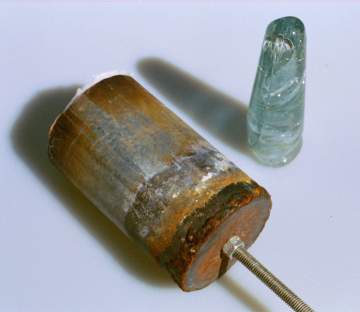 2001-10-07 Had a good
session today, not a lot done, but several new things. Used the
cylinder punty for the first time to shape the bottom of a solid
piece and used the wire goblet punty to make a second piece with
smaller wire. Learned in both cases that care must be taken to
secure the piece. The cylinder needed to have additional frax
stuffed in as the piece flopped around inside - it obviously
works best with uniform pieces, like bottles.
2001-10-07 Had a good
session today, not a lot done, but several new things. Used the
cylinder punty for the first time to shape the bottom of a solid
piece and used the wire goblet punty to make a second piece with
smaller wire. Learned in both cases that care must be taken to
secure the piece. The cylinder needed to have additional frax
stuffed in as the piece flopped around inside - it obviously
works best with uniform pieces, like bottles. 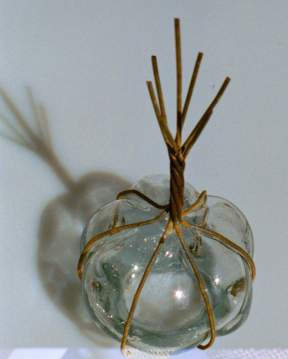 The wire goblet punty needs to have a precise center
hole and/or extra secure wire tie down as it wobbled.
The wire goblet punty needs to have a precise center
hole and/or extra secure wire tie down as it wobbled.
2001-09-22 Updated the page of my glass, adding to notes on glass
already there and starting to log what I am working on. Here are
some of the other photos I developed with short notes. 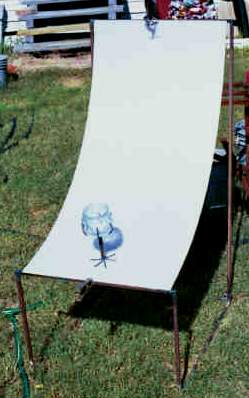
At the right is photo stand I made, modeled after the much
larger one seen two years ago at Corning.
The 2x4' piece of sandblasted plex has been tucked in the office
for a year. The stand is made of 1/2" square welded tubing
and much of the delay has been working out and then making it so
it would fold up and not take space when not in use. The plex is
stored between two sheets of 1/4" plywood covered with a
heavy sheet of wrapping paper. The frame is 24" x 48"
tall with the base being 30" and the front rise being 18"
(so it folds up to 24x48) Mounting the plex for a test run showed
that the stress of the plastic would hold the frame without
further braces to get in the way of lighting. I intend to make a
base, also folding, to raise the unit to a more comfortable
height. To take the photo of the goblet below - in the position
shown in this photo - I turned the unit in the sunlight until I
was happiest.
This is the new metal hut 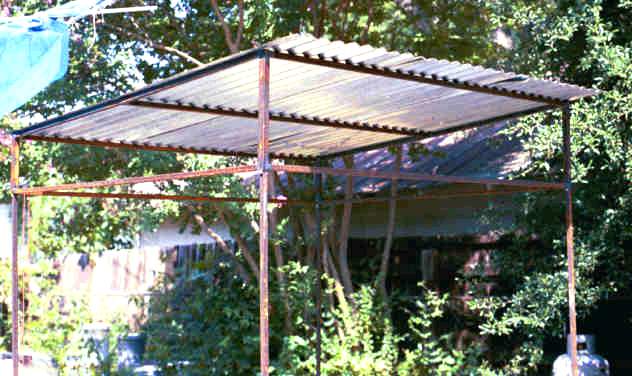 I built to protect equipment
for overnight running, metal for heat resistance, replacing a
wooden unit still up to hold the annealler and cold working,
which has a dirt floor. Most of the tubing is 1/2" square 16
gauge. The four corner posts are 1" square so the verticals
below the horizontal rail slide in. Bolts through holes support
the top on the posts and it is, at the moment, literally tied
down. It was made tall, so I could walk under the horizontal, but
it seems a bit high for rain protection. Still thinking on that.
I built to protect equipment
for overnight running, metal for heat resistance, replacing a
wooden unit still up to hold the annealler and cold working,
which has a dirt floor. Most of the tubing is 1/2" square 16
gauge. The four corner posts are 1" square so the verticals
below the horizontal rail slide in. Bolts through holes support
the top on the posts and it is, at the moment, literally tied
down. It was made tall, so I could walk under the horizontal, but
it seems a bit high for rain protection. Still thinking on that.
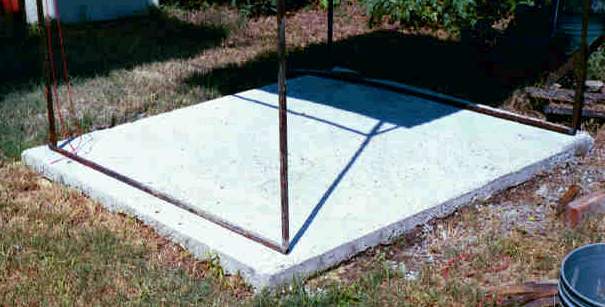 The base is poured concrete with reinforcing mesh.
The tubing is held to the concrete with lag screws into lag
anchors drilled into the concrete. For
more on concrete
The base is poured concrete with reinforcing mesh.
The tubing is held to the concrete with lag screws into lag
anchors drilled into the concrete. For
more on concrete
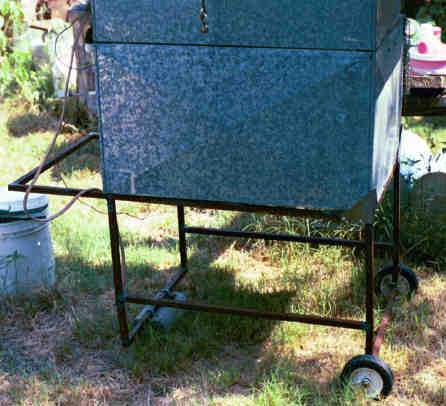 I also welded up, some time ago, a new base for the
annealler, again of 3/4" square tubing, to replace the wood
base that had slowly deteriorated after 9 years outdoors. The
only notable things are the side rails being my standard 6"
up from the bottom supports, here raised higher by the addition
of wheels and leveler block, and the bent 16 gauge metal angles
screwed with self drilling screws onto the corners, right, to
keep the unit in line on the stand.
I also welded up, some time ago, a new base for the
annealler, again of 3/4" square tubing, to replace the wood
base that had slowly deteriorated after 9 years outdoors. The
only notable things are the side rails being my standard 6"
up from the bottom supports, here raised higher by the addition
of wheels and leveler block, and the bent 16 gauge metal angles
screwed with self drilling screws onto the corners, right, to
keep the unit in line on the stand.
2001-09-20 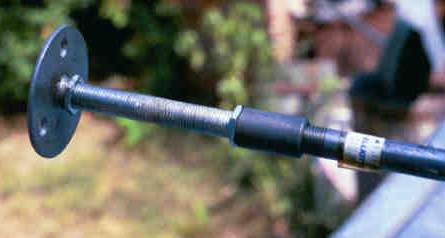 Took some
pictures and went to Eckard for development and a photo disk - 1
hour, $15, could have gotten a CD. One photo below right. The
picture at right (from the same roll, taken earlier) shows the
specially built punty to hold the wire frame base to work the
goblet glass. When making this one, light wire was twisted around
one leg of the base and through the hole in the plate. At the
time is it was blown there was a center wire coming down from the
base into the center of the punty. More
Took some
pictures and went to Eckard for development and a photo disk - 1
hour, $15, could have gotten a CD. One photo below right. The
picture at right (from the same roll, taken earlier) shows the
specially built punty to hold the wire frame base to work the
goblet glass. When making this one, light wire was twisted around
one leg of the base and through the hole in the plate. At the
time is it was blown there was a center wire coming down from the
base into the center of the punty. More
2001-09-13 11:45 Just finished a good
session, the first one in a long time and the 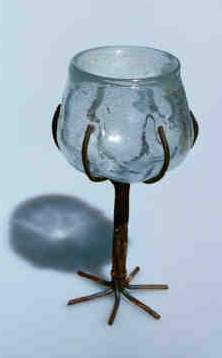 first with the rig on the concrete pad. Things went
fairly well. Lost a bowl at the start, but made a pretty good
marble and several bowls and a neato (technical term there) large
goblet in the second twisted wire stem I made, using the new
punty designed for the purpose - which needs its jam nut jammed
or something to keep it from loosening. Pictures when available.
first with the rig on the concrete pad. Things went
fairly well. Lost a bowl at the start, but made a pretty good
marble and several bowls and a neato (technical term there) large
goblet in the second twisted wire stem I made, using the new
punty designed for the purpose - which needs its jam nut jammed
or something to keep it from loosening. Pictures when available.
2001-09-06 I have done a couple of
nights of a pattern of falling asleep (intentionally) instead of
fighting it, and getting up about midnight (11:30 tonight, now 1:36
am) and working for several hours. Last night I was outside
wiring the new metal shed; the rain had stopped and it was
pleasant although nearly 100% humidity from lots of rain (fog
rising off arms while working) to bed at 4:15 to get up at 5:45.
Locked Blackie cat in the garage, although I called, and missed
that she was in there when I went out with food this morning (9-5)
in rain. She was complaining in the evening when I went to feed
her.
Some time in August I went out to Paxton Woodworking and bought a
5/8" board of cherry and a 5/8" cherry dowel. I cut
part of the board last night and cut dowels (square, then drove
them through holes in steel plate to round) to dowel the board
into a V without glue. After handling the V, I added a handle
from the dowel (which I also use as a rod for working the glass)
to grip along the spine. I put it to soak for supporting long
thin pieces.
2001-09-02 From the Corning Museum of
Glass site "New Glass Review Competition 23 - All
glassmakers, artists, designers, and companies are invited to
participate in New Glass Review 23.
Only glass designed and made between October 1, 2000, and October
1, 2001, may be submitted for this annual survey.
Each year, The Corning Museum of Glass conducts a
worldwide competition to select 100 slides of innovative works in
glass. A committee drawn from designers, artists, museum
directors, curators, and critics will make the selection.
Entry Deadline: October 15, 2001
The New Glass Review competition will be judged during
the first week of December. All entries, accompanied by a
$15.00 U.S. entry fee*, must be postmarked no later than October
15, 2001.
for more see Corning Museum of
Glass - NGR 23
2001-08-23 From: "Palapas of
Araby Cove" < palapa@msn.com
>
Subject: artist request
Date: Tuesday, August 21, 2001 9:17 PM
Greetings from Palm Springs,
We are the local art colony in Palm Springs called Palapas Art
Gardens. 30 artists maintain their studios on the grounds where
we give classes, hold special events for large companies and sell
art to the public. Locally owned, world reknowned.
We currently have only two glassblowers and are looking to add
two more.
If you have a glassblower interested in spending the season in
Palm Springs (Sept-May) please let me know. This would be a great
oppotunity for an artist with an established body of work. We
sometimes have orders of 200+ pieces at a time.
Thank you for your interest.
Cindy Taylor (760) 416-1818
Palapas.net
2001-08-08 Watched videos of Chihuly
I got from the library, notes in BIBLIO.
Stumbled across the fact that Glass
Axis, the public studio in southern Ohio, moved in July.
2001-08-05 A frustrating weekend -
very hot 102.3F in shade on front porch - and when I did the
concrete work, I used the rented truck to get new tanks of O2 and
Acetylene. Which meant the regulator was encountering 2000 psi on
the O2 for the first time in 2 years; and the diaphram blew out.
I'll get it back Tuesday, but no welding in the meantime.
2001-07-29 Well, I spent part of the
day moving the furnace and the gloryhole to the new concrete pad
and some of the rest of the day (besides sleeping) setting up a new web page to group page listings for
better control and access. I will post some pictures when they
get developed. The hole and furnace are very heavy and I used a
set of casters mounted on wood plates that have great capacity
that I take very good care of, and I moved everything very slowly.
As I look out this evening, I wonder if I have made the roof too
high, so am I providing any real rain protection? We actually had
some rain today, dripped off the back edge of the roof onto the
back of the pad. I shall have to add some panels, I think, that
will shield from the side and I already have planned a flip up
front that will add sun shade when up and rain protection when
down.
2001-07-19 I spent the day working to
my limits in the hot sun and I am feeling the pain at 11 pm. My
original plan, which would have allowed working in a cooler part
of the day, was short circuited by having a $19.95 (plus $14
insurance, plus $.59 per mile) box van available only from 9-5
instead of 24 hours. I could have put it off for a week, but a
better plan would have been to hire some help. In any case,
having gone ahead, I biked over to U-Haul and with the rented
truck I 1) swapped out my almost empty rented O2 and Acetyline
tanks 2) bought a supply of 1" and 0.75" square 16
gauge tubing [partly for glass step up, but also steps for rehab
strength building on my legs.] 3) refilled my half empty 100#
propane tank 4) came back to the house and unloaded 1,2, & 3,
then 5) went to Home Depot and rented a small electric motor
driven concrete mixer, buying 18 80# bags of Quickret mix and 5
50# bags of sand. Then I returned to house, started work and half
DIED.
What I was doing was pouring a 5.5 foot by 6.5 foot by 3"
slab on which I will bolt down the 5x6 foot shelter I have
already welded up. Under the shelter will go the glory hole and
furnace so the furnace can run overnight and in rain without also
drying out the wood structure it is under now on dirt.
Besides the effort of moving 18 bags (2 or 3 at a time) in a
wheelbarrow or on a handtruck from the middle of the driveway to
the center of the backyard and picking them up and dumping them
in the frame, it was way too hot to be outside working. I was
working until I was dizzy, even though I had rigged shade of a
sort and had a fan blowing. I drank, today, a gallon of Gaterade,
a couple of quarts of water, and over a quart of soda pop. I
soaked my hat in water, sprayed myself from the hose, quit work
to sit in deeper shade of the garage with the blower on in there.
Finally, I was so shot, about 2 pm, that I went in the air
conditioned house, stripped off my soggy clothing and laid down
for half an hour. I may have created a problem with the slab
doing that, because the work before the break hardened up rather
too fast. I got the last of the crete poured, the mixer cleaned
and returned just at the time due, cleaned the truck and filled
it with diesel fuel and returned it 20 minutes early. I biked
home and took a hot then cool shower, afraid if laid in the bath,
I might not get out, because several major muscle groups either
cramped or started to as the day ended. The concrete is curing
under plastic with a fair amount of water. The highest temp I
heard was 97F, but there was little wind and a lot of direct sun.
Still officially 88F outside.
2001-07-12 If you are in Corning NY
on a Tuesday evening in July or August, you might wish to stop by
The Studio to share in a discussion called The Gather. Basically
this is the instructors from The Studio classes for the week
sitting down together, but since the instructors are pretty good
people, it can be worth while. Call 607-974-6467 for details or
check the website
page with details.
2001-07-09 The lava lamp people have
come out with sparkly flecks in bottles shaped like the original.
More at Lavasubs
2001-07-01 With reference to blowing
glass in metal, Guild.com is showing Jorg Zimmermann's pieces
blown through wire mesh. shown in an ad in the Summer 2001 Glass
magazine, p.13, the glass passing through the mesh (which ends
enclosed inside the piece) is merged back together, forming
dozens of prisms/rooms/chambers inside the wall of the piece
between the surface and the mesh. As of today, nothing is on the
site.
2001-06-28 Having cast a new aluminum
cone, much smoother than the old one, I drilled it 7/16" and
tapped it 1/4" NPT (pipe thread) to allow use with the valve
in my shop blower. When I went to buy an adaptor from soft copper
tubing (so I could have a manual tube) to 1/4" NPT, was
astounded at the cost of sweat copper fittings. The smaller they
got the higher in cost, $3.99 for 1/4" tubing to 1/4"
NPT. A more complicated item machined from solid brass with a 3/8"
flare to 1/4" NPT was only $0.79. Which is what I got. PIC
2001-06-24 1:23 AM During
this week, 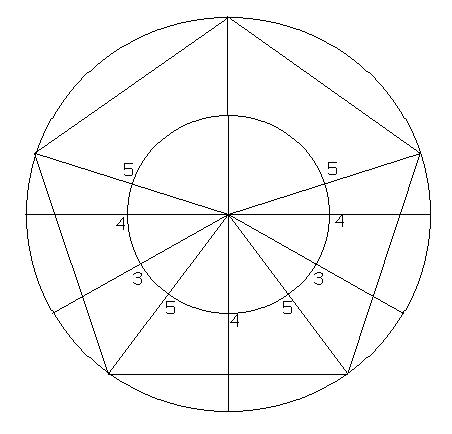 while
getting ready to blow glass again, I have enhanced the version of
rod optic shown below. Using the pattern at right, which offers
layout lines for 3, 4, and 5 prong, looks sketchy, but clicking
on it will show it full sized (the inner circle being 1"
radius, 2" diameter.) Actually, 3 is easy, just use dividers
set at the radius and mark off two spans around the circle (a
radius marks a circle 6 times) 4 is fairly easy if you remember
how to construct a perpendicular. 5 is hard so here is it handy.
My plate has tapped holes for 3 and 5. The top center line is
included in all layouts.
while
getting ready to blow glass again, I have enhanced the version of
rod optic shown below. Using the pattern at right, which offers
layout lines for 3, 4, and 5 prong, looks sketchy, but clicking
on it will show it full sized (the inner circle being 1"
radius, 2" diameter.) Actually, 3 is easy, just use dividers
set at the radius and mark off two spans around the circle (a
radius marks a circle 6 times) 4 is fairly easy if you remember
how to construct a perpendicular. 5 is hard so here is it handy.
My plate has tapped holes for 3 and 5. The top center line is
included in all layouts.
Although it is not exactly how I did it, here is how I would
suggest making one of these.
- Use a 1/4" (6mm) steel plate available at many
hardware stores as 4x12" (100x300mm) pieces. Cut a 4x4
(100x100mm) square.
- Scribe the center point (corner to corner if you did a
great job of cutting, otherwise get close) and center
punch it.
- Use a number 25 bit to drill a center hole, tap it for 10-24,
countersink it, and insert a flat head Phillips machine
screw to act as center. (I center punched, but did not do
the screw, which is needed for a pivot below)
- Tape down the paper, using a nail or scribe to place the
center at the center of the screw. If perpendicular lines
are scribed on the metal through the center point, they
can be used for line up.
- Punch each of the intersections of a radial line and a
circle. (add another circle at 1.5" radius if
desired.)
- Use a small diameter drill (1/8") to center drill
each of the punches to provide a bigger punch for the
angled bit below.
- Make a mount, 1x6x6-8" wood is okay, to hold the
steel plate with a screw through the center so it can be
rotated to do each of the holes in turn.
- Either tilt the drill press table to 10° or make a block
to go under the mount to hold it at 10°.
- Clamp the mount down in position so the center pivot is
"down hill" from the drill point and the drill
point is over one of the hole sites.
- Use a #7 bit to drill the angled hole using cutting fluid.
Rotate the plate to line up the next hole on the circle
and drill that.
- When all of the holes are drilled, move the mount to a
vice or other convenient work site and tap each of the
holes at the same 10° angle.
- Use bolt cutters or hacksaw to cut the
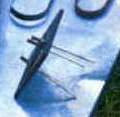 heads
off 5 6-8" long 1/4" bolts with smooth (non-threaded)
shafts. Thread the bolts into the plate and use a hacksaw
to cut off the extra thread below the plate. (Can also be
made from smooth rod with a die, only about 1/3"
being threaded, say 7-8 threads.) File the ends to remove
sharp corners.
heads
off 5 6-8" long 1/4" bolts with smooth (non-threaded)
shafts. Thread the bolts into the plate and use a hacksaw
to cut off the extra thread below the plate. (Can also be
made from smooth rod with a die, only about 1/3"
being threaded, say 7-8 threads.) File the ends to remove
sharp corners.
- Clean the bolts and plate of cutting fluid - at least my
brand reacts with zinc plating and makes goop.
- The rods can be arranged to form 3, 4, or 5 lobe optics
if all the holes are drilled and tapped.
Materials & Tools: 1/4" steel plate, 6-8"x 1/4"
hex or carriage bolts with smooth shafts, #25 & #7 drill
bits, #10-24 and 1/4"-20 taps, tap handle, drill press,
cutting fluid, bolt cutters or hacksaw.
2001-06-09 11:30 PM - I have
been working on puntying metal forms to blow in. Posting to the Craft Web Hot
Glass site produced two interesting suggestions with problems.
David W. suggested fusing a button to the metal in the kiln and
puntying to that. 'simple man' suggested just getting the metal
hot and picking up with glass on the punty. My problem with each
is the need to keep the glass connection hot, especially on a
brass form, while working the blown glass. But while replying, I
had my brain stimulated and here is most of my reply.
: Hi Mike. I think I understand what you are doing; it would
help me visualize it if you could
:describe in more detail what the finished piece is intended to
look like. But I'll go with my
:assumption:
:[Do a button of glass in a kiln and fire it to metal]
... the problem of keeping the punty link hot seems critical
to me and limits choices.
I want to keep my options open, whether tight metal on glass (like
Lalique) or loose (Mexican glass in metal), low pieces or raised.
A glass punty connection will be really tricky to keep hot when
there is metal around it (imagine the goblet with the wire base
bent down like the top - spider legs, then imagine brass or
bronze which melts at 1500. I am going to have a tricky enough
time keeping the metal okay around the blown glass.)
With iron I can go to red heat, as I did working the goblet lip
close to the metal, but I can't with brass. A cast brass/bronze
piece with legs and a glass connection inside the legs would be
hard to heat. [The browser crashed while I was working the
previous reply and while composing, I realized that I could cast/weld
not just a loop, but a lot of extra metal, say between the legs,
to give me a connection point, cutting off the extra and grinding/polishing
the metal as part of coldworking cleanup.]
There are some things I won't be able to do, but I would like to
work the lip/top after the glass is in the metal to share the
form of the lip/top with the form of the blown glass bulging
through the metal. I would also like to try (try I say) adding
glass bits, like a handle, that loop from the glass, over the
metal and back to the glass, that make it clear that the glass
and metal are integrated, not a glass piece with metal soldered/welded
around it.
Even as I say these words, new ideas come to me - if the glass is
bulging, I should be able to form a wrap from bulge to bulge -
like a cage cup.
My next steps will be to make a better mount and more complicated
forms and work on getting the glass into the form either already
on the mount or transfering to the mount. Process is sometimes my
most important product.
2001-06-08 11:25 PM - 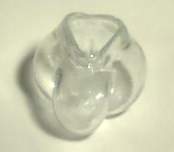 I spent part of tonight
fooling around with two video sources that I bought cheap. Both
are disappointing, but they let me show some images now of my
work described below. The first picture at the right is one of
the pieces I blew into the triple rods mounted on the plate. The
picture was taken with a little Aptec UBS camera and has been
cropped and is only 172x152 pixels. Getting the camera to the
best focus was a hassle. The camera produces 320x240 pixel images.
The piece was fun to blow, getting the glass shaped to fit in the
rods and evenly centered was the primary learning experience.
I spent part of tonight
fooling around with two video sources that I bought cheap. Both
are disappointing, but they let me show some images now of my
work described below. The first picture at the right is one of
the pieces I blew into the triple rods mounted on the plate. The
picture was taken with a little Aptec UBS camera and has been
cropped and is only 172x152 pixels. Getting the camera to the
best focus was a hassle. The camera produces 320x240 pixel images.
The piece was fun to blow, getting the glass shaped to fit in the
rods and evenly centered was the primary learning experience.  Here is picture of the
tri-rod plate. The 1/4" thick plate is about 4x4 inches. The
rods are 1/4"x 6" carriage bolts with the head cut off.
At the time of the picture, the extra thread had not been trimmed.
Here is picture of the
tri-rod plate. The 1/4" thick plate is about 4x4 inches. The
rods are 1/4"x 6" carriage bolts with the head cut off.
At the time of the picture, the extra thread had not been trimmed.
The 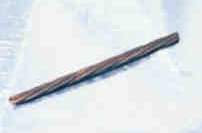 other picture is of the goblet blown in
the wire form. To the right is a snip from a photo of the
original wire rope. Below is the result of the work, taken with
the X-10 wireless remote camera feeding through AVer USB video
tuner, again 320x240 originally
other picture is of the goblet blown in
the wire form. To the right is a snip from a photo of the
original wire rope. Below is the result of the work, taken with
the X-10 wireless remote camera feeding through AVer USB video
tuner, again 320x240 originally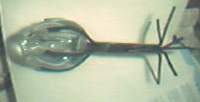 .
.
Bigger picture taken with Aptek.
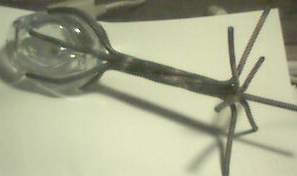 The goblet
barely works. The glass is not well gripped. In the photo, the
center wire of the stem has not been cut off. It was used as
support during working the edge of the glass, but the holder was
not well prepared so the piece wobbled.
The goblet
barely works. The glass is not well gripped. In the photo, the
center wire of the stem has not been cut off. It was used as
support during working the edge of the glass, but the holder was
not well prepared so the piece wobbled.
2001-06-01 11:10 PM
Had a good session last night, using some of the new tools I had
made up, and even wrote up some notes only to have the computer
lock up before I saved it. I was on vacation for the last week,
half of it in Louisiana, and spent a couple of days welding the
new support for the annealler (PIC to come) and the basic frame
for the new metal cover for the furnace and gloryhole. (PIC)
I drilled a plate with 3 holes at a 10° angle on a 2"
circle and tapped the holes to take 1/4" rod. (PIC)
I also cut a 12" (30 cm) length of wire rope (from a 15' (5
m) piece found by the street about a year ago)
about 1/2" (12 mm) dia. made of 7 3/16" (4 mm) wire
strands and then braised the middle to hold them together. Then I
used the torch to bend out the strands on one end to make a
goblet base, leaving the center straight as a support. On the
other end, I bent the six outer strands to make a cup (finger?)
shape and burned off the center wire.
found by the street about a year ago)
about 1/2" (12 mm) dia. made of 7 3/16" (4 mm) wire
strands and then braised the middle to hold them together. Then I
used the torch to bend out the strands on one end to make a
goblet base, leaving the center straight as a support. On the
other end, I bent the six outer strands to make a cup (finger?)
shape and burned off the center wire.
During the session, I was able to blow 3 lobed
shapes in the rod plate and work them to make squat little vases
with triangular openings. (PIC) I was able, with less
certainty, to make a goblet in the wire cable form. Problems
included not having a closely matched hole in the pipe to hold
the bottom post, so it wobbled. Not having a sure target - it was
on the wobbly post - or a tall enough step to do it stuck in the
ground. What did work was having a wire to hook the foot and hold
the form against the pipe, so I was able to reheat and shape the
mouth of the piece in the wire form. The glass is too small in
the fingers, but shaped right. A good first pass.
I was able, with less
certainty, to make a goblet in the wire cable form. Problems
included not having a closely matched hole in the pipe to hold
the bottom post, so it wobbled. Not having a sure target - it was
on the wobbly post - or a tall enough step to do it stuck in the
ground. What did work was having a wire to hook the foot and hold
the form against the pipe, so I was able to reheat and shape the
mouth of the piece in the wire form. The glass is too small in
the fingers, but shaped right. A good first pass.
I also converted an over stretched piece to a folded vase that
looks interesting. One failure was picking up the vase shape from
last session to open the top out; although it was at 890, it
cracked on applying the hot punty. Not sure if the punty was too
hot or the annealler too cold.
Used about 1/3 tank (33# or 6-7 gallons) of propane from lighting
up at about 5 to shutting down at 11. I need to keep a more exact
log; I even have the book.
I am very impressed by the quality of service from the 1 hour
film processing from Eckerd Drugs. After a recent experience
where a previously good (3 days) place took two weeks to get film
and computer disk back, I asked about the disk at Eckerd and
found they can do both diskette and CD. Not only did I get a
diskette with tiny color images on the label, but there was an
index print with the regular 4x6" prints and the cost came
in under what I had paid before by a buck or so. Ask about all
the services and be sure the person on duty knows what to do;
mine had to ask, having done CD's before, but not diskettes. [On
a second trip, took under one hour, still good.]
2001-05-22 7:33 PM Ron
Marrs came into the Store today and we had a brief conversation
about Hickory Street HotGlass. He and his son, Chris, and a
couple of other people are going to stay there, gaining more time
to blow, including a couple of commissions. Jim Bowman is
moving to new quarters over the expressway across from downtown.
Hugh Erwin is backing off a bit from blowing.
2001-05-20 10:03 PM Spent
portions of a very humid, hot day working on welding frames and
cleaning up yard for monthly curbside trash pickup. Took the
annealler off the disintegrating wooden frame it has had since
the early 90's and began preparing a welded frame for it. I
braised a couple of more cross pieces on the track for the thread
puller, so that the light sheet metal (flashing) will be better
supported when I am using it to sort glass chunks.
I am planning a metal cover and concrete base for the furnace and
gloryhole to protect them from rain without risking wood drying
above them. I had planned until today to put it at right angles
to my current shed so its back would be to the sun and and
extension would provide shade for blowing in the afternoon. Now
that I have cleared out the annealler frame and a 20# propane
bottle frame, I find there may be enough space along the fence
between the BBQ/foundry brick and the wood shed, which would put
it more out of the way. That concrete base is going to be very
permanent. More thought.
When I looked over the glass that I did last Thursday it was both
better and worse than I expected. The air stem was evenly spaced
and nicely shaped, but there was more ridging in the outside than
I expected. The marbles were okay, but I clearly need more work.
Vacation starts Thursday and we are going to Louisiana for part
of it, but I am going to do as much glass as possible.
2001-05-17 11:58 PM Just
came in from a session blowing glass for most of the evening. I
will be using this space from now on to write paragraphs that
will be moved to the current issue of Hot Glass Bits. The session
went well, at least by my standards, which are fairly low right
now. I was able, again, to get the clear bubble freeglass that I
had gotten before, by cleaning and sorting the cullet, melting it
fairly hot and then squeezing/cooling it. This was the first
session with a new flat pot, having wrecked the last new flat pot
by heating too fast, although the glass was very clear.
I tried a number of new things while also working on old skills.
I made a couple of marbles, including one with a bubble
supposedly in the middle. I did an air twist stem that had evenly
spaced bubbles, but it still tapered too much. I tried putting my
initials in bubbles in a paperweight, got something, but clearly
need to make the bubbles bigger to start with and really cool the
glass down before casing it. I tried for a good sized bowl, but
lost it off the punty while working on the rim, so I have a sort
of a vase.[It came out good enough, I think I will reheat it and
reform it.]
I made more use of the chunk of cherry wood that I have cut with
a long curved slot to support long thin shapes and drilled with
hemispheres to help shape marbles, etc. I had not made up
newspaper pads for some time and used one a bunch.
I wonder if a tool with a curved shape on one tweezer arm and an
edge on the other would work better for air stem bubbles than the
current tool which is two edges and clearly takes practice to get
evenly spaced on the glass.
2001-04-15 Received Press Release
from Henry Ford Museum for Internship for 1 year
2001-04-01 The marbles I made are obviously chill marked as
well as having grotesque punty bumps.
2001-03-22 Very nice evening session after spending the
morning doing some shop welding. Got to use the gimmick mentioned
below and will post pictures sometime soon. Mostly practice new
techniques - pulling rod and stringer and handling torch, but
made some marbles and a fairly nice bowl. Am working toward a
bigger bowl to put a glass ball with drilled holes and marbles
and a pump and some water!
2001-02-23 Working my way through building a trolley for
spinner for glass that carries the Hot Head torch. I am impressed
by the Hot Head as a braising torch, it really throws out the
heat, but is not very adjustable.
CHUNK GATHER - 2001-02-23 -----Original Message-----
From: hotglass@operamail.com <hotglass@operamail.com>
To: Mike Firth
Date: Thursday, February 22, 2001 8:50 PM
Subject: Re: Have you ever heard the term "chunk gather"
On 20 Feb 2001, at 21:10, Mike Firth wrote:
> No.
> The only thought that occurs to me is picking up hot (900F)
color or clear
> chunks of glass, which is often done, the result being taken
to molten in
> the glory hole. I have not heard it called this,
usually called color
> pickup.
It apparantly is something similar to this. It's a way of making
a blown object using only chunks of glass (clear predominantly)
picked up from an annealer. No furnace glass is used at all.
Steven Hall--
Oakville, ON Canada | http://www.creativethink.com
hotglass@operamail.com
| http://srn-022-120.sheridanc.on.ca
Ah, well. I just haven't heard the term. I am
familiar with the concept and have done it. I think the
people who get the most out of it are paperweight makers who buy
hockey puck sized/shaped glass, like from Schott and use the blob
to encase lampworked material. There are people who go to
a furnace glass place and blow a series of 2-3 gather hollow
blobs, anneal and take them home where they don' t have a
furnace, but preheat and pickup on a pipe for further working.
If you want something weird to play with, put some beer bottles (or
other bottle glass) in the annealler and a small piece of kiln
shelf in the glory hole so you can melt a bit of broken bottle
glass to put on the end of the pipe. Heat the pipe, work
the bit of glass around and go into the annealer and get the
bottle, sealling the mouth to the pipe. Play around.
Caution: if you are using Spruce Pine, that melts at a much lower
temp than the bottle glass and keeping the bottle under control
on the pipe is nearly impossible, that's why the scrap of bottle
glass. Cheers, Mike Firth
2001-02-?? Had a very nice session, with the clearest glass I
have blown out of this rig, by carefully selecting cullet,
heating and squeezing.
2001-01-31 This is sort of a summary. I got my knee worked on
01-12 with the artroscopic surgery relieving the pain
immediately, although it is taking time to recover and I am still
having feet problems from the Lyme disease.
 2001-10-07 Had a good
session today, not a lot done, but several new things. Used the
cylinder punty for the first time to shape the bottom of a solid
piece and used the wire goblet punty to make a second piece with
smaller wire. Learned in both cases that care must be taken to
secure the piece. The cylinder needed to have additional frax
stuffed in as the piece flopped around inside - it obviously
works best with uniform pieces, like bottles.
2001-10-07 Had a good
session today, not a lot done, but several new things. Used the
cylinder punty for the first time to shape the bottom of a solid
piece and used the wire goblet punty to make a second piece with
smaller wire. Learned in both cases that care must be taken to
secure the piece. The cylinder needed to have additional frax
stuffed in as the piece flopped around inside - it obviously
works best with uniform pieces, like bottles.  The wire goblet punty needs to have a precise center
hole and/or extra secure wire tie down as it wobbled.
The wire goblet punty needs to have a precise center
hole and/or extra secure wire tie down as it wobbled. 
 I built to protect equipment
for overnight running, metal for heat resistance, replacing a
wooden unit still up to hold the annealler and cold working,
which has a dirt floor. Most of the tubing is 1/2" square 16
gauge. The four corner posts are 1" square so the verticals
below the horizontal rail slide in. Bolts through holes support
the top on the posts and it is, at the moment, literally tied
down. It was made tall, so I could walk under the horizontal, but
it seems a bit high for rain protection. Still thinking on that.
I built to protect equipment
for overnight running, metal for heat resistance, replacing a
wooden unit still up to hold the annealler and cold working,
which has a dirt floor. Most of the tubing is 1/2" square 16
gauge. The four corner posts are 1" square so the verticals
below the horizontal rail slide in. Bolts through holes support
the top on the posts and it is, at the moment, literally tied
down. It was made tall, so I could walk under the horizontal, but
it seems a bit high for rain protection. Still thinking on that. The base is poured concrete with reinforcing mesh.
The tubing is held to the concrete with lag screws into lag
anchors drilled into the concrete.
The base is poured concrete with reinforcing mesh.
The tubing is held to the concrete with lag screws into lag
anchors drilled into the concrete.  I also welded up, some time ago, a new base for the
annealler, again of 3/4" square tubing, to replace the wood
base that had slowly deteriorated after 9 years outdoors. The
only notable things are the side rails being my standard 6"
up from the bottom supports, here raised higher by the addition
of wheels and leveler block, and the bent 16 gauge metal angles
screwed with self drilling screws onto the corners, right, to
keep the unit in line on the stand.
I also welded up, some time ago, a new base for the
annealler, again of 3/4" square tubing, to replace the wood
base that had slowly deteriorated after 9 years outdoors. The
only notable things are the side rails being my standard 6"
up from the bottom supports, here raised higher by the addition
of wheels and leveler block, and the bent 16 gauge metal angles
screwed with self drilling screws onto the corners, right, to
keep the unit in line on the stand. Took some
pictures and went to Eckard for development and a photo disk - 1
hour, $15, could have gotten a CD. One photo below right. The
picture at right (from the same roll, taken earlier) shows the
specially built punty to hold the wire frame base to work the
goblet glass. When making this one, light wire was twisted around
one leg of the base and through the hole in the plate. At the
time is it was blown there was a center wire coming down from the
base into the center of the punty.
Took some
pictures and went to Eckard for development and a photo disk - 1
hour, $15, could have gotten a CD. One photo below right. The
picture at right (from the same roll, taken earlier) shows the
specially built punty to hold the wire frame base to work the
goblet glass. When making this one, light wire was twisted around
one leg of the base and through the hole in the plate. At the
time is it was blown there was a center wire coming down from the
base into the center of the punty.  first with the rig on the concrete pad. Things went
fairly well. Lost a bowl at the start, but made a pretty good
marble and several bowls and a neato (technical term there) large
goblet in the second twisted wire stem I made, using the new
punty designed for the purpose - which needs its jam nut jammed
or something to keep it from loosening. Pictures when available.
first with the rig on the concrete pad. Things went
fairly well. Lost a bowl at the start, but made a pretty good
marble and several bowls and a neato (technical term there) large
goblet in the second twisted wire stem I made, using the new
punty designed for the purpose - which needs its jam nut jammed
or something to keep it from loosening. Pictures when available.
 heads
off 5 6-8" long 1/4" bolts with smooth (non-threaded)
shafts. Thread the bolts into the plate and use a hacksaw
to cut off the extra thread below the plate. (Can also be
made from smooth rod with a die, only about 1/3"
being threaded, say 7-8 threads.) File the ends to remove
sharp corners.
heads
off 5 6-8" long 1/4" bolts with smooth (non-threaded)
shafts. Thread the bolts into the plate and use a hacksaw
to cut off the extra thread below the plate. (Can also be
made from smooth rod with a die, only about 1/3"
being threaded, say 7-8 threads.) File the ends to remove
sharp corners. I spent part of tonight
fooling around with two video sources that I bought cheap. Both
are disappointing, but they let me show some images now of my
work described below. The first picture at the right is one of
the pieces I blew into the triple rods mounted on the plate. The
picture was taken with a little Aptec UBS camera and has been
cropped and is only 172x152 pixels. Getting the camera to the
best focus was a hassle. The camera produces 320x240 pixel images.
The piece was fun to blow, getting the glass shaped to fit in the
rods and evenly centered was the primary learning experience.
I spent part of tonight
fooling around with two video sources that I bought cheap. Both
are disappointing, but they let me show some images now of my
work described below. The first picture at the right is one of
the pieces I blew into the triple rods mounted on the plate. The
picture was taken with a little Aptec UBS camera and has been
cropped and is only 172x152 pixels. Getting the camera to the
best focus was a hassle. The camera produces 320x240 pixel images.
The piece was fun to blow, getting the glass shaped to fit in the
rods and evenly centered was the primary learning experience.  other picture is of the goblet blown in
the wire form. To the right is a snip from a photo of the
original wire rope. Below is the result of the work, taken with
the X-10 wireless remote camera feeding through AVer USB video
tuner, again 320x240 originally
other picture is of the goblet blown in
the wire form. To the right is a snip from a photo of the
original wire rope. Below is the result of the work, taken with
the X-10 wireless remote camera feeding through AVer USB video
tuner, again 320x240 originally .
. The goblet
barely works. The glass is not well gripped. In the photo, the
center wire of the stem has not been cut off. It was used as
support during working the edge of the glass, but the holder was
not well prepared so the piece wobbled.
The goblet
barely works. The glass is not well gripped. In the photo, the
center wire of the stem has not been cut off. It was used as
support during working the edge of the glass, but the holder was
not well prepared so the piece wobbled.